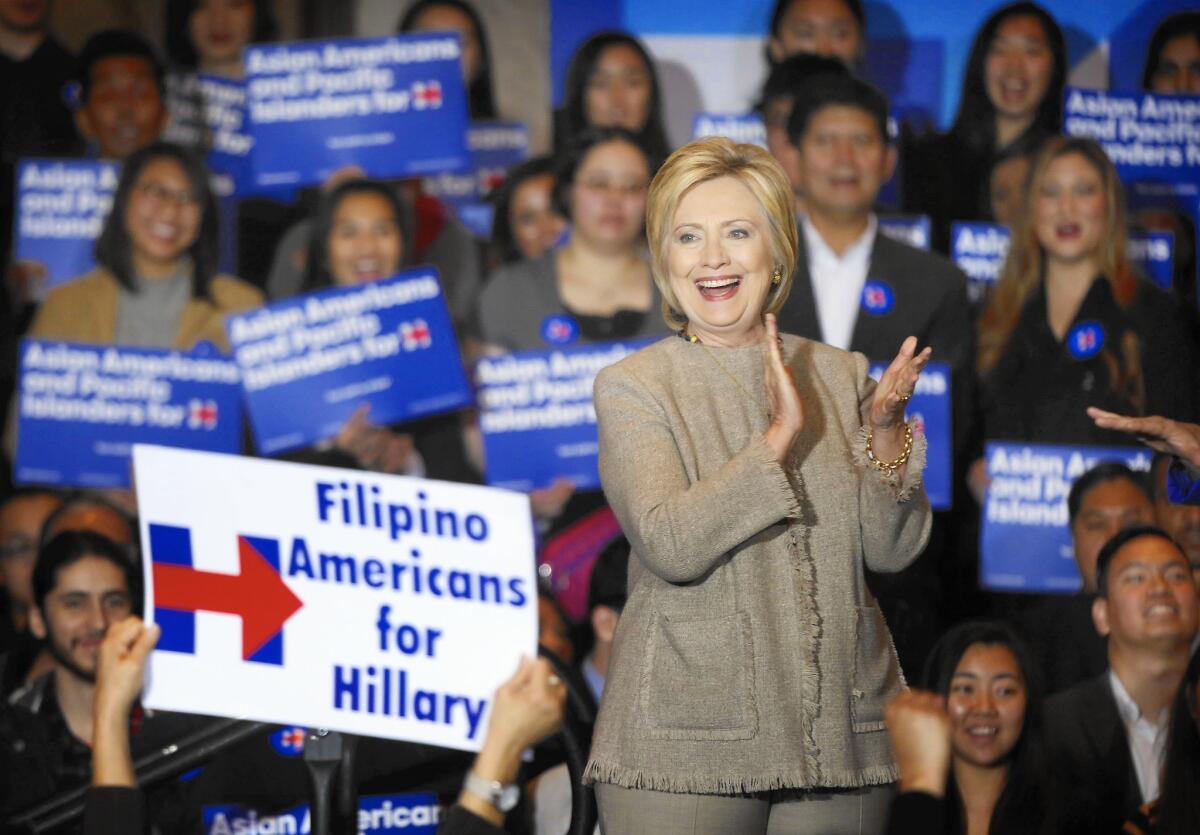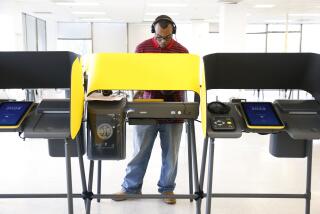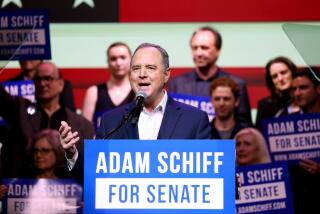Analysis: ‘Caution’ seems to be the watchword in this political cycle

Democratic presidential candidate Hillary Clinton campaigns in the San Gabriel Valley.
Californians who awoke last week from a 20-year slumber might have been confused at the messages delivered during two key political events in the state.
On Thursday, a governor repeatedly warned against excessive spending, pointing to charts that predicted a “devastating” recession in the near future, demanding that politicians save money for that rainy day and only sparingly look at the possibility of raising taxes.
At about the same time, across the state, a leading presidential candidate was also talking about government restraint, particularly when it comes to the economy and its impact on struggling Americans.
“I want to be the small-business president,” the candidate said.
Before your lengthy nap, you might have bet that those statements had been made by Republicans. Yet the speakers last week were Democrats, Gov. Jerry Brown and presidential candidate Hillary Clinton.
Taken together the two have come to represent some measure of caution in a political year defined by the opposite, which is a cosmic development considering that both have been characterized as loopy liberals by their many GOP opponents. (In truth, Brown has long had a fiscal conservative bent, and Clinton’s political DNA at least in part reflects her Midwestern upbringing.)
Both are playing against two foes. The first is the image, long nurtured by Republicans, of Democrats as politicians who basically pay off their voters with taxpayers’ money. (Witness Mitt Romney’s post-election hazing of President Obama, on what he thought was a private call with supporters, as a Democrat who had won by giving “a lot of stuff” to young people, Latinos and those in need of healthcare coverage.)
They are also fighting against members of their own party. In Brown’s case, it is more liberal legislators and ambitious politicians seeking office in the 2016 and 2018 elections — unlike Brown, who cannot run for re-election. In Clinton’s case, it is the passionate followers of Bernie Sanders, the Vermont senator and democratic socialist who has proven to be a persistent thorn to the former secretary of state with his assaults on Wall Street and the economic establishment.
We’ll leave it to friends and foes to hash out the percentages, but at root, some of the positioning is a heartfelt representation of principles. Some is likely driven by their view that a centrist approach offers a better guarantee of success, in theory reaching more voters than candidates who hew to the more invigorated poles. The latter positioning will be tested this year by Sanders’ candidacy.
There’s no small bit of irony residing on the plot of ideological land now occupied by Clinton and Brown. It represents the lasting vestiges of a Democratic remaking that was accomplished by her husband, Bill Clinton, after he defeated Jerry Brown and others to win the presidency in 1992.
President Clinton was the great triangulator, trying to appeal to independent and Republican voters with moves to the center that often focused on cultural issues, such as welfare reform, despite Democratic Party opposition. But his goal was to not become the fourth straight Democratic nominee to lose the White House, and his goal was achieved.
Brown, in that race, was the insurgent dynamo, free-wheeling around the country and baiting Clinton until the nomination was secured during the June California primary. It was Brown who sought to channel that year’s angst by arguing that voters needed to “Take America Back” and blaming big-money donors and their recipient campaigns for ruining the nation. He also forwarded a 13% flat tax proposal, which he said would insure economic fairness.
In contrast, Brown last week oozed nuance and deliberation as he unveiled his $170.7-billion budget for the coming fiscal year.
His charts were efforts to still the Legislature’s enthusiasm for spending now that California is closer to an even economic keel. One, drawn in particularly garish red and black, showed the impact of increasing the budget were the economy to falter: “More permanent spending, combined with recession, would be devastating,” it said.
Several times, he returned to the argument that there were many good deeds government could accomplish, but it needed to choose wisely. He urged caution when asked about a proposal to raise the minimum wage to $15 per hour. Moving it up to $10 per hour accounted for a quarter of a billion dollars in costs in the new budget, he said.
“These are all good things. Government does not consciously do bad things,” he said. But in the event of a recession, “too many goods become bad … you have to cut things” like school and childcare spending.
“Across the board, there’s only so much money. And we have to balance it,” he said.
At her Thursday event in San Gabriel, Clinton emphasized immigration before the largely Asian audience, but took pains to say she’d be in their corner when it came to easing the way for business. She also has spurned the notion of tax hikes for Americans making under $250,000 annually.
“I don’t think we should be imposing new big programs that are going to be raising middle-class families’ taxes,” she said last month. Sanders has proposed tax increases to pay for services like universal healthcare; a third candidate, former Maryland Gov. Martin O’Malley, has left open the possibility of middle-class tax hikes.
In his budget proposal, Brown recalled a high school lesson in which his teacher had charted the ups and downs of the economy and said that economists were trying to even out the boom-and-bust gyrations. Sixty years later, Brown noted, they were still trying, without success.
There are political cycles, too; the liberal Democratic wave of the 1980s was washed away in the moderate Democratic surge of the 1990s. Many in the party want things to reverse now. But last week, at least, Brown and Clinton were pushing back against the tide.
Twitter: @cathleendecker. For more on politics, go to www.latimes.com/decker and www.latimes.com/politics.
More to Read
Start your day right
Sign up for Essential California for news, features and recommendations from the L.A. Times and beyond in your inbox six days a week.
You may occasionally receive promotional content from the Los Angeles Times.







